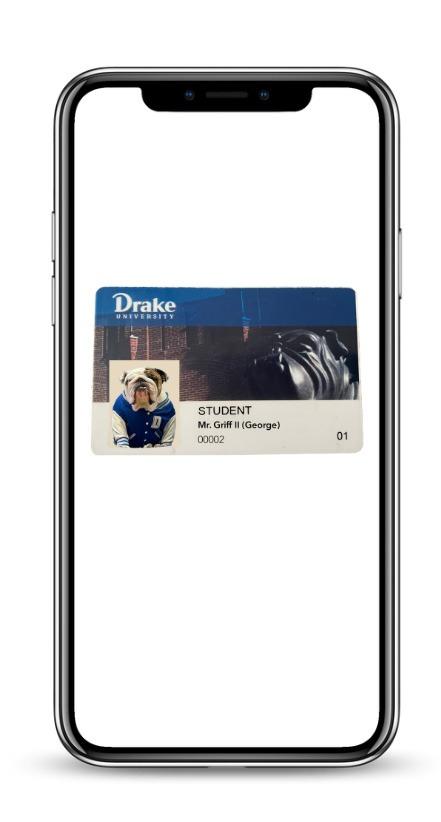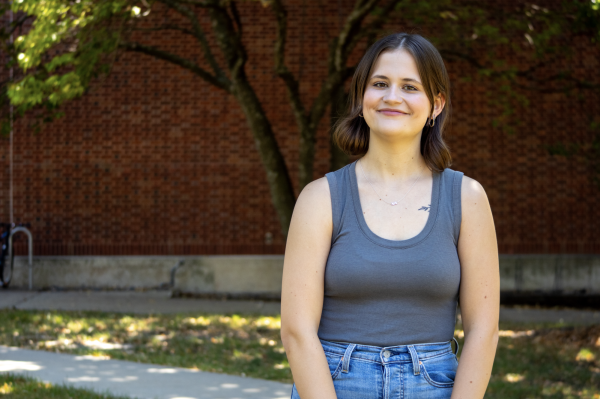Drake will be the first college or university in Iowa to offer mobile credentials to students. With an anticipated campus-wide roll out for the spring semester, virtual student IDs will begin to replace physical IDs on campus.
“We have fire alarms at two o’clock in the morning. You’ll see students out there with their cell phone and a towel, but they may not have anything else with them. So I think this is a huge step,” said Director of Public Safety Scott Law. “Our students live in an era and a date and time where having information on your phone, having your Apple Pay or credit cards or even plane tickets on your phone is just normal. We realize this is the way of the future, this is where people are going.”
The next incoming first-year class will not be given physical IDs. However, students who already have physical IDs will be able to continue to use them, and there will be options for students who do not have devices moving forward.
“Just from a functionality perspective, printing physical cards and supporting card printing software and machines is an art that is going away,” ITS Project Manager Jeff Regan said. “As we see a higher adoption rate for mobile IDs across campus and as users get through that period of kind of learning how it works and getting used to it, we expect to see an ease and improvement from a user experience perspective of getting an ID and not having to worry about if you’ve lost it going through a much longer process.”
The virtual IDs will be compatible with most Apple iPhone and watch models and many Android phone and watch models, Law said. Students will be able to add their mobile credentials to one phone and one smartwatch through the Transact eAccounts app.
“The virtual IDs will work just as the physical cards work right now,” Regan said. “Doors, printers, dining, Starbucks — all of those will work just as they do now.”
The mobile credentials were developed in conjunction with Transact Campus, who created the Transact eAccounts app. The company has worked on similar projects and was able to guide Drake through the development process with Apple, Regan said.
“Transact has acted as the mediator between Drake and Apple, so we have not had to directly engage with them at a corporate level,” Regan said. “They know what those hurdles and sticky points are going to be, so they could let us know to kind of handle those hurdles earlier in the process and make sure we were focused on those so there were no big surprises.”
Transact required that Drake test the mobile credentials on at least 1% of the campus population. However, the project team decided to go beyond this number, and a test group of 200 people started after Thanksgiving break and will run through the rest of the semester.
“The opportunity to use students in that first test group allowed us to see where there might be something that we thought was clear in the message, because we didn’t sit down with them, [Regan] didn’t sit down with them and say do this. He actually sent them the same email to what we’re going to send out to the rest of the campus to say, ‘Here’s how you do it,’” Law said. “And then they were like, ‘Oh, it would have been better if you had said it this way or if you had added that.’ So students have been essential in helping us to go through that learning process.”
Mobile credentials have been in the works at Drake for several years, although the actual process only started after it was approved by the President’s Council at the end of the previous spring semester.
“When we started the conversation with Transact, probably four or five years ago, about this process, we knew when we started adding card access to the campus from the beginning that we wanted the campus to be mobile credential enabled, so we bought devices that would eventually allow us to do that to lower the expense when Drake did eventually decide to make that commitment,” Law said.
Drake is not the first institution nationwide to implement virtual IDs. However, Law believes that learning from other school’s mistakes has been beneficial to this development at Drake.
“Although it would have been great to be the first school, sometimes it’s better to allow a few other places to work the bugs out,” Law said. “Because of lessons learned at other institutions, because of marketing things that they’ve done, I think we’ve had a strong plan, and we still have a really strong plan moving ahead to the final roll-out day.”
After the mobile credentials are completely released at Drake, the project team will remain assembled to address issues or concerns.
“Once we do roll this out for the whole campus, we want to hear if there’s something that comes up. If there’s an issue or a concern, we want to hear,” Law said. “The project team will stay in existence through probably the spring semester to make sure that we don’t run into any issues, but we’ve tried to really get in a good number of people from across campus.”








